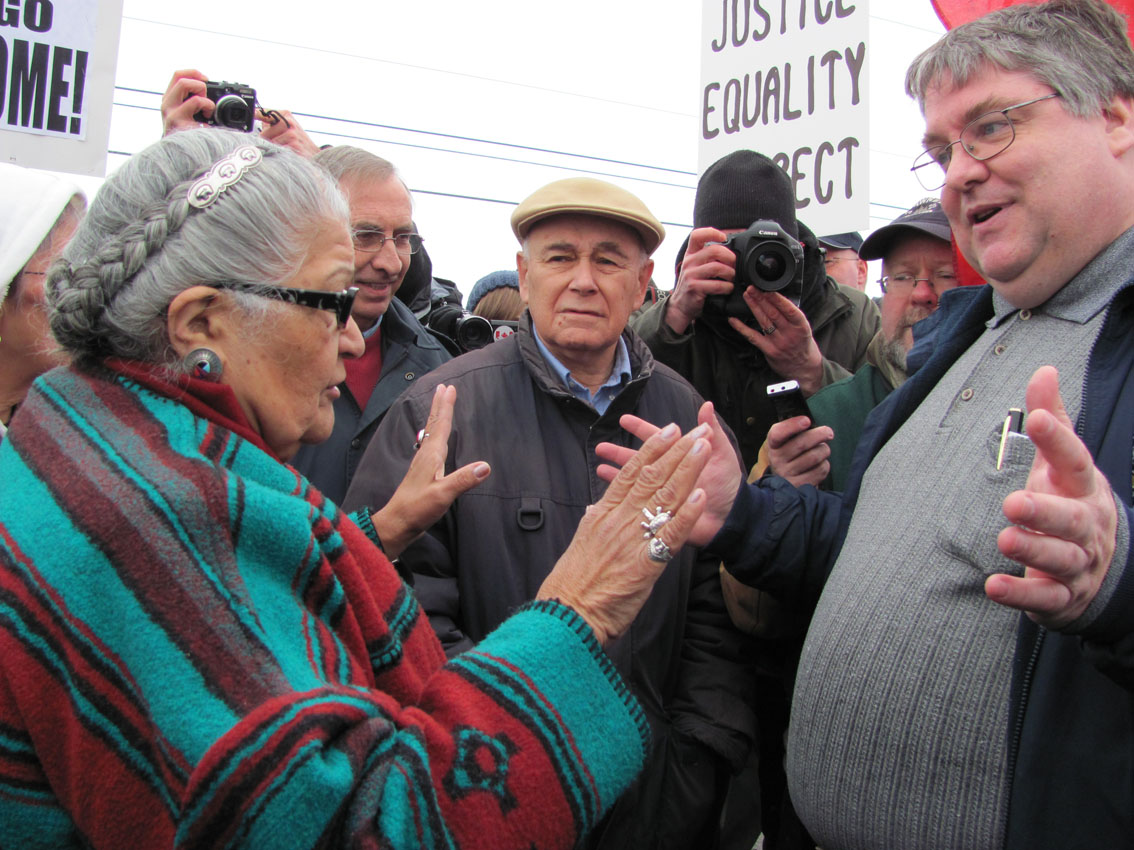Six Nations, Caledonia Residents and Activists Come Together to Support Land Reclamation
Six Nations, Caledonia Residents and Activists Come Together to Support Land Reclamation

Yesterday, February 28 2011, was the 5th year anniversary of the land reclamation at Kanonhstaton in Caledonia, Ontario. On Sunday the 27th, solidarity activists and local residents were asked by members of Six Nations to be present to help protect this land from bitter, over-colonized settlers. The aim of these settlers was to erect a monument on the reclaimed land asking for an apology from Six Nations, the Ontario Provincial Police and the Ontario Provincial Government for what they call 'unfair treatment of white residents during the occupation.'
On this day in 2006, a group of Six Nations people began occupying a planned housing development on land that was disputed in unresolved land claims. A crude and violent raid on the site by the OPP on April 20 of that year frightened all and injured many, some permanently. The land is on the main road of a town adjacent to and nearly indistinguishable from the Six Nations reservation. Various inhabitants have mixed reactions to the ongoing, though now relatively quiet occupation: some support the reclamation and come to help protect it as they did yesterday, some move on unperturbed, and some, decidedly more vocal as they clearly feel somehow threatened, have staged anti-native rallies and have had their own fair share of blockades and tire-burnings.
"While [organizers of the anti-native rallies] McHale and Vandermaas claim they are ‘antiracist’ ‘nonviolent’ activists inspired by Dr. King, their language, actions and connections reveal a much different story," says PhD student Katie Milley. "Following the patterns of white backlash movements since the 1960s, they misappropriate the language of the civil rights movement and make the unfounded claim that white people are the victims of racism and race-based policing." Evidently, McHale was unprepared for a such a loud and large activist response to his actions. He relocated his self-titled "Truth and Reconciliation" rally immediately after buses unloaded roughly 60 people in his originally chosen location. The diverse group was made up of supporters from Toronto, Guelph, Kitchener-Waterloo and Hamilton, as well as representatives from the Christian Peacemaker's Team, the Six Nations Solidarity Network, CUPE 3903 and the CAW. The group grew by approximately 20 more local and Six Nation residents when it reached his second choice, which was a few hundred yards away from Kanonhstaton and where members of Six Nations had parked their trucks to prevent McHale from reaching the site. He glowed in the media's pale spotlight and asserted his imposing voice and stature over everybody around him, constantly interrupting calm conversation, raising his voice to be heard over the voices of reason which included those of Six Nations elders, and of course, consistently trying to remind the crowd (and probably also himself) that he is an innocent victim in this situation.
The next couple of hours were spent shuffling from spot to spot on the slushy pavement and having raucous and chaotic discussions. Although members of Six Nations and solidarity activists were remarkably understanding of McHale and company's ignorant rhetoric, he and his pitifully few companions seemed only to want for people to cower under his beady glare and hateful words. More than one person of color mentioned after the rally that when approaching supporters of McHale, they were greeted with sneers, racial slurs and questions about heritage and nationality.
After being repeatedly rebuffed by the OPP, who, make no mistake, do not support Six Nations but really loathe McHale, he decided to ignore any suggestions of taking his structure home, and proceeded to send his people down the road towards the barricades. This reporter overheard that he himself did not attempt to bring the monument down to the site because he preferred to 'avoid violent provocation.'
Six Nations and activist women formed lines and linked arms in front of the entrance to the site behind the first barricade, although an enthusiastic group prevented the crew from getting too close to the lines or the entrance. A few shouting matches later, the 'white victims' picked up their monument and walked back up the road, unsuccessful in their attempts to place the monument on Kanonhstaton or even on the road nearby. Joyful whoops filled the air and the crowd whistled and waved goodbye, promising to see McHale next year on the 6th anniversary of the reclamation or even sooner, as he has pledged to come back monthly until his wooden pyramid is permanently affixed to land he denies he hasn't any right to claim, in his own name or in the name of the 'public.'
United in their common goal of eradicating racism, Six Nations members, locals, elders from the outlying communities and solidarity activists shared a potluck meal at Kanonhstaton before splitting up for the day. The common area heated up quickly as people conversed and rehashed ironic or insulting moments. There was sadness in hearing stories of one another's struggles, but there was also laughter and the overwhelming feeling was one of understanding and solidarity. As many activists said in a variety of ways throughout the day, McHale does not represent all settlers, and he must be made aware that he cannot appeal to a false sense of white victimhood in order to soothe his bruised ego. Those who organized and attended the counter-rally, the real "Truth and Reconciliation" gathering, acknowledge that without real humility, the willingness to be wrong, admit mistakes and change, 'justice' and 'peace' are words without honor, more meaningless terms in a world where language is not always used to communicate, but merely to dominate.
photos: Deb O'Rourke

